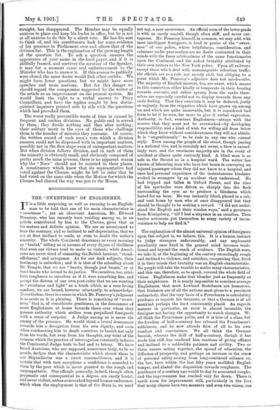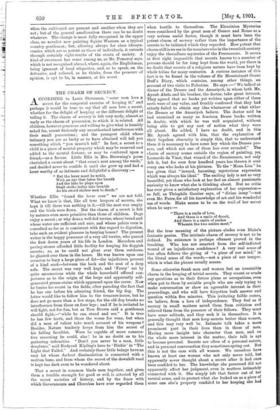THE " SWEETNESS " OF ENGLISHMEN.
IT is a little surprising as well as amusing to an English- man to be told that one of his main characteristics is " sweetness " ; yet an observant American, Mr. Eltweed Pomeroy, who has recently been residing among us, in an article contributed by him to the Clarion, gives that as his mature and definite opinion. We are so accustomed to hear the contrary, and so inclined to self-depreciation, that we are at first inclined to smile, or even to doubt the writer's sincerity. The whole Continent denounces us every morning as "brutal," telling us in accents of every degree of shrillness that even our virtues tend to make us violent; while Ameri- cans are never tired of censuring the British hauteur, " stand- offishness," and arrogance. As for our dark subjects, their testimony is unbroken ; and it is that of the schoolboy about Dr. Temple, that we are " beasts, though just beasts," or at least beasts who intend to do justice. We ourselves, too, attri- bute roughness to ourselves as if it were something fine, and accept the dictum of our own poet-critic that we are wanting in " sweetness and light" as a truth which, as a race loving candour, we are bound, however reluctantly, to acknowledge. Nevertheless, there is a sense in which Mr. Pomeroy's judgment is as acute as it is pleasing. There is something of " sweet- ness," that is, of considerate gentleness, in the demeanour of most Englishmen at home towards those over whom they possess authority which strikes even prejudiced foreigners with a sense of surprise. A Judge among us is never the enemy of the prisoner. He would think a brutal demeanour towards him a derogation from his own dignity, and even when condemning him to death contrives to banish not only from his words, but even from his thoughts, any taint of the rancour which the practice of interrogation constantly induces the Continental Judge both to feel and to betray. We have heard Austrians, who are supposed, sometimes truly, to be so gentle, declare that the characteristic which struck them in our Stipendiaries was a sweet reasonableness, and it is certain that with rare exceptions a confidence is accorded to thim by the poor which is never granted to the rough and unsympathetic. Our officials generally, indeed, though often Pragmatic and consequential to a degree, are rarely brutal, and never violent, unless overworked beyond human endurance, which when the employment is that of the State is, we need not say, a rare occurrence. An official even of the lower grade is with us rarely uncivil, though often stiff, and never out- rageous. Mr. Pomeroy himself, in common, we may add, with most intelligent foreigners, is loud in praise of the "sweet- ness " of our police, whose helpfulness, consideration, and calmness under provocation are no doubt contrasted in the,ir minds with the fussy arbitrariness of the same functionaries upon the Continent, and the naked brutality attributed by their own writers to the New York police. -Upon all railways except those which deal with unmanageable suburban traffip, the officials are as a rule not merely civil, but obliging to a point which Mr. Pomeroy's adjective does not misdescribe. The majority of English masters, too, are sweet, which means in this connection either kindly or temperate in their bearing towards servants, and unless sprung from the ranks them- selves are especially careful not to display towards them any caste feeling. That they entertain it may be deduced, justly or unjustly, from the etiquettes which have grown up among us, and which are quite immovable, but it is considered bad form to let it be seen, far more to give it verbal expression. Authority, in fact, sweetens Englishmen—always with the reserve that they must not be overworked—by developing responsibility, and a kind of wish for willing aid from below which they know without considerateness they will not obtain. It is "ungentlemanly " to be rude to any one who cannot reply. Even among the people of the street, though jeering is a national vice, and is certainly not sweet, a blow is exceed. ingly rare, and the enormous majority are in the event' of accident or illness quite curiously kind. A blind man is as safe in the Strand as in a hospital ward. The writer*has known of labouring men who have lost hours in conveying an injured passenger whom they did not know to a hospital, and once had personal experience of the instantaneous kindness evoked in strangers by an accident they understood. He had tripped and fallen in Oxford Street, and the rims of his spectacles were driven so sharply into the flesh surrounding the eyes as to produce a blindness which lasted for an hour. He was instantly lifted, placed in a cab, and sent home by men who at once disappeared lest they should be thought to be seeking a reward. "I did not under- stand the English and their wooden ways," said a governess from Konigsberg, " till I lost a sixpence in an omnibus. Then twelve automata put themselves to every variety of incon- venience to help me find it."
The explanation of the almost universal opinion of foreigners upon this subject is, we believe, this. It is a human instinct to judge strangers unfavourably, and any unpleasant peculiarity once fixed in the general mind becomes tradi- tional and beyond the reach of evidence. The English were, we take it, at the beginning of the century exceedingly rough and inclined to violence, and outsiders, recognising that, fixed it in their minds that brutality was an English characteristic. No people will take the trouble to notice many characteristics, and this one, therefore, so to speak, covered the whole field of vision. Englishmen make that blunder just as frequently as their neighbours. It is nearly impossible to convince average Englishmen that most Lowland Scotchmen are humorous, that Irishmen are of all the nations most given to a pessimist melancholy, that the very basis of a Frenchman is calculating prudence as regards his interests, or that a German is of all mankind perhaps the least consistently placid. As regards manner in particular, an error is almost incurable, the foreigner not having the opportunity to watch changes. Ws all think the Frenchman polite, and it is true of a class, but the freedom of half-a-century has released the Frenchman's selfishness, and he now attends first of all to his own comfort and convenience. We all think the German boorish, whereas the drill of half-a-century, though it has made him stiff, has rendered him cautious of . giving offence and inclined to a soldierlike patience and civility. Two or three causes acting together, the spread of education, the diffusion of prosperity, and perhaps an increase in the sense of personal safety arising from long-continued reliance on the law, have within the last fifty years mollified English temper, and abated the disposition towards roughness.. The gentlemen of a century ago would to-day be accounted roughs, and the improvement has reached very far down. There is much room for improvement still, particularly in the fact that many classes have two manners and even two voices; one
when the cultivated are present and another when they are not ; but of the general amelioration there can be no doubt whatever. The change is most fully recognised in the upper class, no novelist now painting Squire Western as a typical country gentleman; but, allowing always for class idiosyn- crasies, which are as potent as those of individuals, it extends through certainly eight-tenths of the strata of society. A kind of sweetness has come among us, as Mr. Pomeroy says, which is not recognised abroad, where, again, the Englishman, being ignorant of local etiquettes, and, so to speak, on the defensive, and relieved, as he thinks, from the pressure of opinion, is apt to be, in manner, at his worst.











































 Previous page
Previous page